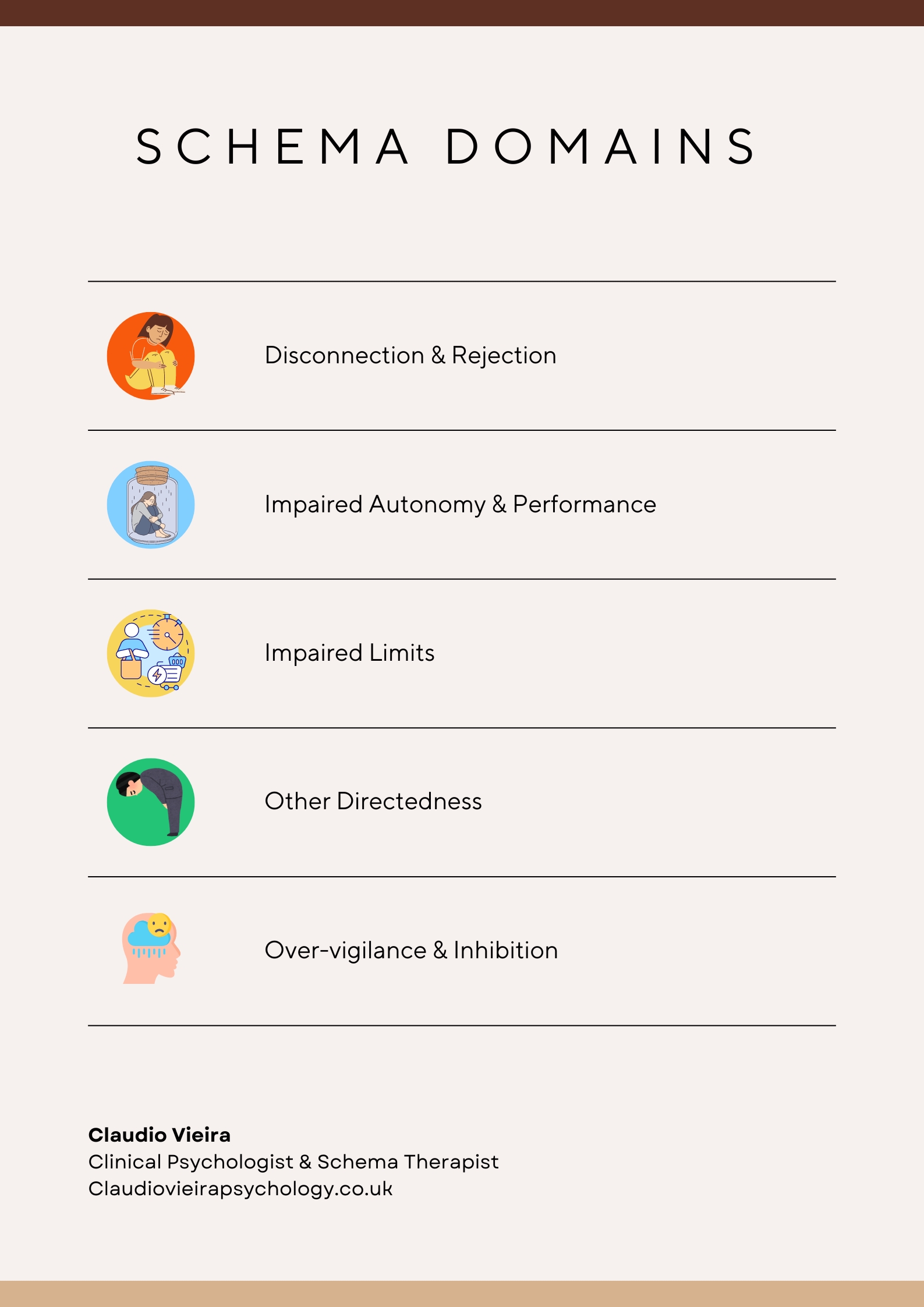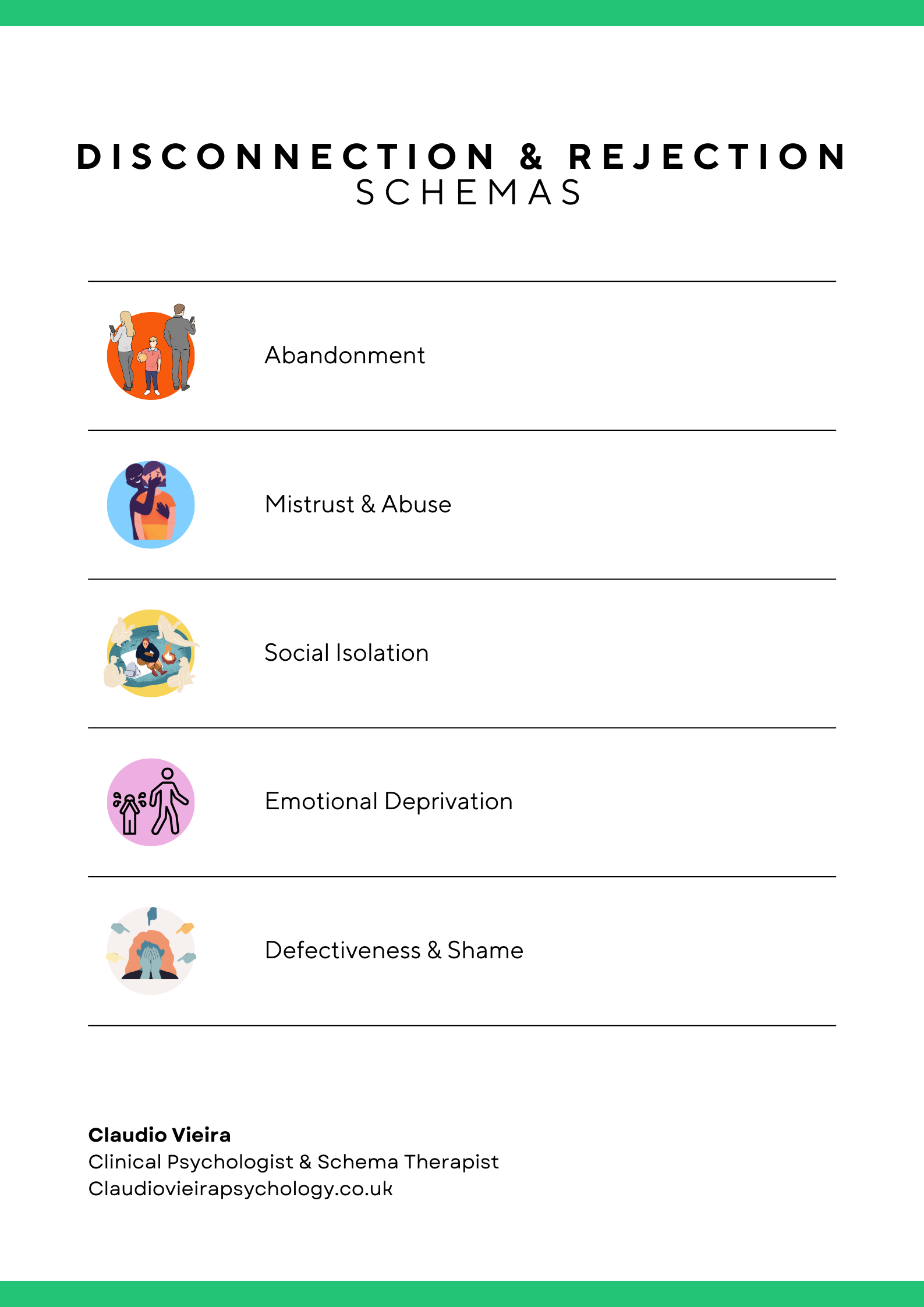
As was covered in the previous post, schemas are our psychological tinted glasses. Often developed in the context of our childhood experiences, these glasses incorporate our beliefs about ourselves, others, and the world. They play a big role in the way we think, feel, and behave in social contexts.
Also, schemas fight for survival. We like consistency and familiarity. That is what keeps us safe in a world that can be unpredictable at times. We strive to maintain a stable view of ourselves and the world, even if it is inaccurate and distressing. That is why if I see myself as a failure, incompetent, and unworthy of love and attention, I feel uncomfortable and don’t believe when people tell me I am important to them, competent, or special. The message I get from others is not consistent with the view I have about myself.
There are 15-18 different schemas, and they are organized into 5 domains.

Let’s have a closer look at the Disconnection and Rejection domain, which includes 5 early maladaptive schemas.

Abandonment – This schema incorporates the belief that people who are important to you cannot support you emotionally or practically. This is because they may need a lot of support themselves, because they are unpredictable or because they will leave and find someone better. E.g. in a romantic relationship, you might worry that, soon or later, your partner will leave you for someone better.
Mistrust/Abuse – The expectation that other people will deliberately set out to try to hurt, abuse, mistreat and manipulate you and not care about upsetting and neglecting how you are feeling. It often feels like it always happens to you, and you always end up getting a raw deal or the short end of the stick compared to others. E.g. it is difficult for you to form new relationships because you expect people to take advantage of you.
Emotional Deprivation – The belief that your need to be cared for and loved by others will never be met, that people will not notice you or give you the affection you want and need from them. You also believe that people do not understand you, and do not want to listen to you or share their feelings with you. You can feel vulnerable because you do not believe people will look after you and protect you. E.g. you don’t share your worries, anxieties, or fears with others as you believe people will not understand you or they won’t be interested in what you have to say.
Defectiveness/Shame – The belief that you are a bad person and that other people cannot like or care for you because there is something wrong with you that makes you an unlovable or unacceptable person. You feel ashamed about aspects of yourself and worry that you will be rejected by other people if they really know what you are like. E.g. it is difficult to genuinely talk about yourself as you believe that you don’t have good qualities and if others knew the “real you”, they would not be interested or they would not accept you.
Social Isolation – The sense that you are different to other people and not part of a group or community. It can feel like you do not fit in anywhere. E.g. when you go out with friends, despite being surrounded by lots of people, you feel you don’t fit in. You may take a passive role in social situations or avoid them altogether.

It is not uncommon for different schemas to be activated in one particular situation or different schemas to interact with each other.
For instance, if I believe I am a bad person (Defectiveness and Shame) I might be prone to feel different from those around me (Social Isolation). Due to these feelings of defectiveness and social alienation, I might be more likely not to share my thoughts and feelings with other people. As I don’t share my struggles, in moments of vulnerability, I might end up feeling emotionally deprived (Emotional Deprivation) or pushing other people away which will lead to me feeling abandoned and rejected (Abandonment).
In the next post, we will look at another schema domain – Impaired Autonomy and Performance.
No responses yet